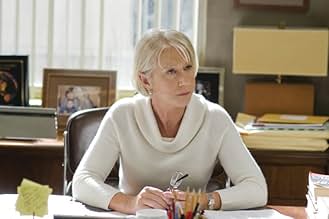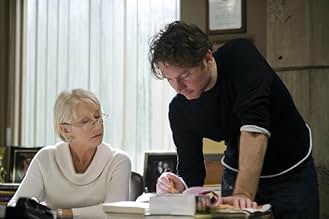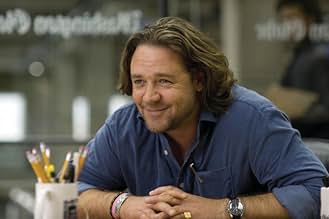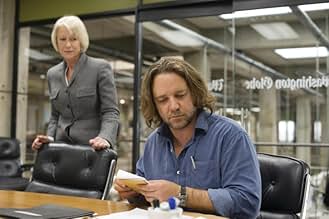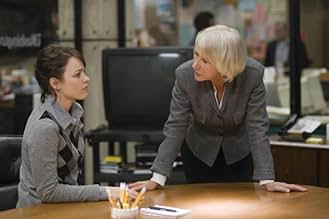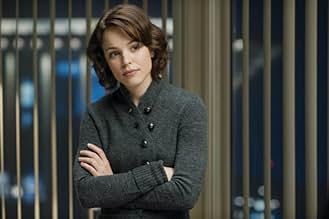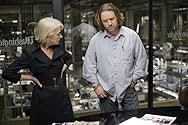When a congressional aide is killed, a Washington, D.C. journalist starts investigating the case involving the Representative, his old college friend.When a congressional aide is killed, a Washington, D.C. journalist starts investigating the case involving the Representative, his old college friend.When a congressional aide is killed, a Washington, D.C. journalist starts investigating the case involving the Representative, his old college friend.
- Awards
- 2 wins & 4 nominations total
Robin Wright
- Anne Collins
- (as Robin Wright Penn)
Steve Park
- Chris Kawai
- (as Stephen Park)
Featured reviews
Whether you loved em' or hated em', espionage thrillers made up a generous portion of cinema from the 1940-50's. With fast paced, edge of your seat story lines, plot twists, political undertones and dramatic personal struggles with morality, nobody did it better than Emeric Pressburger and Michael Powell. Their attention to character detail and it's purpose in conjunction with the narrative gave heart and humanity to this new string of movies which could have fallen into similar (yet shallower) alpha male characters such as James Bond. Never the less, we cannot forget that ultimately if it weren't for their vision and invention of the genre, Hollywood may have never capitalized on the staggeringly profitable Bond franchise that's still going strong today.
In the mid 70's, due to the heat of the political environment at that time, the genre decided to go in the same direction. All The Presidents Men, brought to light the investigative strategies of Bob Woodward and Carl Bernstein and tackled the Watergate scandal from the perspective of the Washington Post. As audiences, we shared in the thrill of being able to follow the case as it unfolded, interviewing witnesses and piecing together clues in order to make a 10 O'clock print deadline. We were part of the chase, the scandal and always privy to the evidence necessary to solve the mystery at hand...that is until a new piece of evidence arose and bashed in all of our original assumptions.
State of Play may be the first film to pay homage to this Pakula classic while dually creating more poignant themes for today's political atmosphere. Crowe plays a reporter for the Washington Post and McAdams, an internet blogger, serving as our Woodward and Bernstein clones on the case of a Senator, Affleck, whose mistress succumbs to a rather untimely death VIA train tracks. To add insult to injury, it turns out that our reporter and senator are practically best friends. The plot unfolds, relationships falter and the real truth, to our pleasant surprise, blindsides us like a drunk driver on a narrow road.
Director Kevin Macdonald clearly knows what he's doing here and along with a well written screenplay by Tony Gilroy, carefully crafts a neat, sharp and extremely entertaining thrill ride of a movie whose run time is 2 hours and 15 minutes, but feels like 30. State of Play never fails at keeping you guessing, does a fine job of throwing in a few curve balls, and leaves you with a clean taste in your mouth come end credits. What more do you want? Sure. It isn't the next Best Picture and Crowe won't take home an Oscar, but you'll enjoy some nail biting action scenes and there are much worse things to look at than Rachel McAdams on the big screen for a few hours.
Helen Mirren is delightful in what little screen time she is given. Affleck is "good", although decided to play it completely safe in a role that even he really can't screw up. Lets face it, he needed to gain even a small amount of points since Hollywoodland and the flops that followed in his footsteps.
Overall, you'll be as pleased and refreshed as I was to see a picture that has the finesse of an espionage thriller, the entertainment value of an All The Presidents Men political drama and the edginess that we should expect from a modern day piece of cinema that doesn't star Miley Cyrus.
In the mid 70's, due to the heat of the political environment at that time, the genre decided to go in the same direction. All The Presidents Men, brought to light the investigative strategies of Bob Woodward and Carl Bernstein and tackled the Watergate scandal from the perspective of the Washington Post. As audiences, we shared in the thrill of being able to follow the case as it unfolded, interviewing witnesses and piecing together clues in order to make a 10 O'clock print deadline. We were part of the chase, the scandal and always privy to the evidence necessary to solve the mystery at hand...that is until a new piece of evidence arose and bashed in all of our original assumptions.
State of Play may be the first film to pay homage to this Pakula classic while dually creating more poignant themes for today's political atmosphere. Crowe plays a reporter for the Washington Post and McAdams, an internet blogger, serving as our Woodward and Bernstein clones on the case of a Senator, Affleck, whose mistress succumbs to a rather untimely death VIA train tracks. To add insult to injury, it turns out that our reporter and senator are practically best friends. The plot unfolds, relationships falter and the real truth, to our pleasant surprise, blindsides us like a drunk driver on a narrow road.
Director Kevin Macdonald clearly knows what he's doing here and along with a well written screenplay by Tony Gilroy, carefully crafts a neat, sharp and extremely entertaining thrill ride of a movie whose run time is 2 hours and 15 minutes, but feels like 30. State of Play never fails at keeping you guessing, does a fine job of throwing in a few curve balls, and leaves you with a clean taste in your mouth come end credits. What more do you want? Sure. It isn't the next Best Picture and Crowe won't take home an Oscar, but you'll enjoy some nail biting action scenes and there are much worse things to look at than Rachel McAdams on the big screen for a few hours.
Helen Mirren is delightful in what little screen time she is given. Affleck is "good", although decided to play it completely safe in a role that even he really can't screw up. Lets face it, he needed to gain even a small amount of points since Hollywoodland and the flops that followed in his footsteps.
Overall, you'll be as pleased and refreshed as I was to see a picture that has the finesse of an espionage thriller, the entertainment value of an All The Presidents Men political drama and the edginess that we should expect from a modern day piece of cinema that doesn't star Miley Cyrus.
About a month before State of Play came into theaters, I read an article in The Washington Post (I live in the D.C. area) about the realism of the news industry as portrayed in the movie. One of the Post reporters served as a consultant on the set and I must say that he seems to have done his job. Almost every aspect, from the constantly chaotic state of the newsroom to the reporter-lingo, feels authentic and true to reality. While there are occasional times when the movie's main character, the reporter Cal McCaffrey, strays from the usual ethical and professional guidelines, there are logical explanations for such instances that are given in the movie. At one point, Russell Crowe even ad-libs a line about the outdated technology he has compared to the state-of-the-art computers given to Della Fry, Rachel McAdams's gossipy blogger: "I've been here fifteen years, I've got a sixteen year old computer. She's been here fifteen minutes and she's got enough gear to launch a f***ing satellite." This line was inspired by the feud between print journalists and their online counterparts that, according to the Post reporter, exists in real-life. Because journalism is so crucial to the story of State of Play, every minute detail contributes greatly to the believability of the film as a whole and it is this attention to detail that really elevates State of Play above the average political thriller.
The cast, which includes three Oscar winners, though Ben Affleck won for screen writing, could not be more perfect. With his long, shaggy hair, bulging belly and old, trash-littered car, Russell Crowe looks appropriately scruffy and he disappears into his role, becoming one of the most convincing journalists on screen in recent years. It is impossible to imagine anyone else in the role, especially Brad Pitt, who was originally signed on for the part. As his partner on the story, Rachel McAdams delivers, giving her character a very energetic yet idealistic flavor. Della Fry is, at least in the beginning, a rather obnoxious woman but, in large part due to McAdams, she gradually becomes more likable and we learn to accept her for who she is. Helen Mirren is splendid as Cameron, McCaffery and Fry's insistent boss, and every time she appears, the screen comes alive (not that it's dead when she isn't there). Ben Affleck once again proves that he can act when given the right material. He gives his character, a promising congressman, an air of detached arrogance mixed with frustrated vulnerability. Representative Stephen Collins certainly has his principles but throughout the film, that sense of morality is largely shrouded in secrets and mystery and the audience is forced to constantly guess and re-guess his true intentions. Aside from the main actors, the supporting cast does a terrific job with a slightly comedic, almost delightfully over-the-top performance by Jason Bateman as a pretentious PR agent. Also worth noting is Viola Davis, who plays a contact of McCaffrey's in the morgue, and even though she only appears in one scene, she makes the most of that short screen-time that, in turn, makes us remember her well.
Other than the superb cast, one of the most impressive things about State of Play is the script, which was written by Tony Gilroy, Billy Ray and Matthew Michael Carnahan and based on the 2003 BBC mini-series of the same name. However, it bears Tony Gilroy's distinctive mark not only because it involves corporate conspiracies and unending twists, but the witty dialogue could have been written by almost no one else. Occasional instances of humor help lighten the otherwise rather dark mood. Also, the writing is highly intelligent and makes the audience actually think rather than simply go along with the complicated plot. This can also be contributed to the direction of Kevin MacDonald who, after winning an Oscar for his documentary One Day in September in 1999 and directing the Oscar-winning feature film The Last King of Scotland, proves that he has loads of talent and hopefully, will remain prominent in the film-making industry.
Other noteworthy aspects of the movie are the cinematography and the score, both of which help carry the tension throughout the entire two-and-a-half hour film, even during quieter scenes. However, State of Play is not quite perfect. The main, and perhaps only, flaw is the minor plot holes that, while virtually unnoticeable during the actual viewing of the movie, become more obvious upon dissecting the movie afterwards. It is impossible to discuss these errors in detail without giving anything away, but they do make the conclusion a little less satisfying.
Nonetheless, the movie is so good in all other areas that it is still easy to overlook the implausibility of the ending. From the virtually flawless cast and writing to the authenticity of its portrayal of journalists and the thought-provoking political themes, State of Play stands out among all the conventional political thrillers churned out by Hollywood in recent years. Go see it!
The cast, which includes three Oscar winners, though Ben Affleck won for screen writing, could not be more perfect. With his long, shaggy hair, bulging belly and old, trash-littered car, Russell Crowe looks appropriately scruffy and he disappears into his role, becoming one of the most convincing journalists on screen in recent years. It is impossible to imagine anyone else in the role, especially Brad Pitt, who was originally signed on for the part. As his partner on the story, Rachel McAdams delivers, giving her character a very energetic yet idealistic flavor. Della Fry is, at least in the beginning, a rather obnoxious woman but, in large part due to McAdams, she gradually becomes more likable and we learn to accept her for who she is. Helen Mirren is splendid as Cameron, McCaffery and Fry's insistent boss, and every time she appears, the screen comes alive (not that it's dead when she isn't there). Ben Affleck once again proves that he can act when given the right material. He gives his character, a promising congressman, an air of detached arrogance mixed with frustrated vulnerability. Representative Stephen Collins certainly has his principles but throughout the film, that sense of morality is largely shrouded in secrets and mystery and the audience is forced to constantly guess and re-guess his true intentions. Aside from the main actors, the supporting cast does a terrific job with a slightly comedic, almost delightfully over-the-top performance by Jason Bateman as a pretentious PR agent. Also worth noting is Viola Davis, who plays a contact of McCaffrey's in the morgue, and even though she only appears in one scene, she makes the most of that short screen-time that, in turn, makes us remember her well.
Other than the superb cast, one of the most impressive things about State of Play is the script, which was written by Tony Gilroy, Billy Ray and Matthew Michael Carnahan and based on the 2003 BBC mini-series of the same name. However, it bears Tony Gilroy's distinctive mark not only because it involves corporate conspiracies and unending twists, but the witty dialogue could have been written by almost no one else. Occasional instances of humor help lighten the otherwise rather dark mood. Also, the writing is highly intelligent and makes the audience actually think rather than simply go along with the complicated plot. This can also be contributed to the direction of Kevin MacDonald who, after winning an Oscar for his documentary One Day in September in 1999 and directing the Oscar-winning feature film The Last King of Scotland, proves that he has loads of talent and hopefully, will remain prominent in the film-making industry.
Other noteworthy aspects of the movie are the cinematography and the score, both of which help carry the tension throughout the entire two-and-a-half hour film, even during quieter scenes. However, State of Play is not quite perfect. The main, and perhaps only, flaw is the minor plot holes that, while virtually unnoticeable during the actual viewing of the movie, become more obvious upon dissecting the movie afterwards. It is impossible to discuss these errors in detail without giving anything away, but they do make the conclusion a little less satisfying.
Nonetheless, the movie is so good in all other areas that it is still easy to overlook the implausibility of the ending. From the virtually flawless cast and writing to the authenticity of its portrayal of journalists and the thought-provoking political themes, State of Play stands out among all the conventional political thrillers churned out by Hollywood in recent years. Go see it!
I cannot describe how much I enjoy a good investigative reporting story, and State of Play really scratched that itch. It also combines that kind of story-telling with the idea of a few people trying to blow the lid on a massive conspiracy that may put their lives in danger, which is another style of film that I love. I was thrilled through most of State of Play, and didn't even care that there were some predictable aspects to the story, because it's not always about finding out whodunnit but seeing how they will be caught. Russell Crowe delivered his same performance he always gives, but it didn't bother me too much here since I was deeply invested in the plot (although I did find myself wondering how much more I'd enjoy it with a better actor.) The rest of the cast did marvelous work, and helped make the entire film more impactful. I even found Ben Affleck to be a good casting choice (for once) because he has the right kind of smarminess that I'd expect from that kind of politician.
For a long time I was convinced that State of Play was going to be one of those legendary films that ticks all the boxes for me, and would become a favorite I'd watch again and again. However, there were a couple of things that held it back from greatness for me, and left me just a little disappointed at the end. First of all, there was a slight interpersonal relationship dynamic between some of the characters that felt unnecessary and detracted from the story for me in a small way. It wasn't terrible, but it came across as pointless baggage they were adding to the characters that didn't enhance the plot in any way. Finally, there's the ending. While I can't dig into any details without touching on spoilers, I'll just say that it did too much to reframe the entire plot of the film, and created more questions than answers. It genuinely took me to a place where I no longer knew how to feel about the resolution of State of Play. I didn't need that twist, and it left me conflicted about a movie I was loving up to that point.
For a long time I was convinced that State of Play was going to be one of those legendary films that ticks all the boxes for me, and would become a favorite I'd watch again and again. However, there were a couple of things that held it back from greatness for me, and left me just a little disappointed at the end. First of all, there was a slight interpersonal relationship dynamic between some of the characters that felt unnecessary and detracted from the story for me in a small way. It wasn't terrible, but it came across as pointless baggage they were adding to the characters that didn't enhance the plot in any way. Finally, there's the ending. While I can't dig into any details without touching on spoilers, I'll just say that it did too much to reframe the entire plot of the film, and created more questions than answers. It genuinely took me to a place where I no longer knew how to feel about the resolution of State of Play. I didn't need that twist, and it left me conflicted about a movie I was loving up to that point.
I would label this a "decent-but-unmemorable political thriller," something you'd probably enjoy viewing but a few weeks later had forgotten much of it. Usually, movies which star Russell Crowe are more dynamic, although Crowe still mesmerizes as usual.
I liked the twists and turns at the end, but one has to wait about two hours for those and that's a little too long a wait. As slick a production as it was, and with acceptable acting from actor, it was many of the characters here that seemed more like Hollywood stereotypes than real-life people.
There was Crowe with the hippie looks from 30-40 years ago and who has the daring of James Bond; the Washington newspaper editor being a foul-mouthed Brit (crusty Helen Mirren) who uses profane expresses the Americans wouldn't know; the neophyte blogster (Rachel McAdams) being drop-dead gorgeous and getting her way despite tough bosses; the bad guys being anyone connected with the military (man, is that getting old, from Dr. Strangelove to today's films - it never changes), the professional sniper/assassin conveniently missing the good guy (Crowe) although he could kill anyone else......you get the picture - a few too many liberal film clichés. The most realistic character was probably "Rep. Stephen Collins (D-Pa)," played by the least of the actors, Ben Affleck.
As for minor characters, I thought "Dominic Foy," played by Jason Bateman, was fascinating, as was Robin Wright.
Overall, for entertainment purposes it was okay; not something you'd yawn and fall asleep watching, although you might be confused here and there. Through the gimmicks of hyped-up music and sound effects here and there, the suspense was evident throughout the two-plus hours. It's also an interesting look at today's battle between old and new "media," meaning newspapers and the Internet, respectively.
Overall, it's enough to warrant as a purchase at the rental store but not as a blind buy despite the "name" cast.
I liked the twists and turns at the end, but one has to wait about two hours for those and that's a little too long a wait. As slick a production as it was, and with acceptable acting from actor, it was many of the characters here that seemed more like Hollywood stereotypes than real-life people.
There was Crowe with the hippie looks from 30-40 years ago and who has the daring of James Bond; the Washington newspaper editor being a foul-mouthed Brit (crusty Helen Mirren) who uses profane expresses the Americans wouldn't know; the neophyte blogster (Rachel McAdams) being drop-dead gorgeous and getting her way despite tough bosses; the bad guys being anyone connected with the military (man, is that getting old, from Dr. Strangelove to today's films - it never changes), the professional sniper/assassin conveniently missing the good guy (Crowe) although he could kill anyone else......you get the picture - a few too many liberal film clichés. The most realistic character was probably "Rep. Stephen Collins (D-Pa)," played by the least of the actors, Ben Affleck.
As for minor characters, I thought "Dominic Foy," played by Jason Bateman, was fascinating, as was Robin Wright.
Overall, for entertainment purposes it was okay; not something you'd yawn and fall asleep watching, although you might be confused here and there. Through the gimmicks of hyped-up music and sound effects here and there, the suspense was evident throughout the two-plus hours. It's also an interesting look at today's battle between old and new "media," meaning newspapers and the Internet, respectively.
Overall, it's enough to warrant as a purchase at the rental store but not as a blind buy despite the "name" cast.
Congressman Stephen Collins (Ben Affleck) is helping with the government investigation of a shady military-based company when he receives word that his mistress has committed suicide. Visually distraught, he leaves a hearing in tears and sets off a media circus. Seasoned reporter Cal McAffrey (Russell Crowe) was his roommate in college, and the two have remained friends. In a bid to quash the political blogging of junior reporter Della Frye (Rachel McAdams), McAffrey sets out to find the truth about the story.
State of Play sets itself up early on to be a cookie-cutter, predictable thriller. But as the film progresses, it rather quickly becomes the twisty and conniving thriller it needs to be. Despite being heavily dialogue driven, the film is an intense ride that will keep people on edge throughout. Some scenes are downright terrifying in their amped up suspense and political intrigue. This film really set out to be tense, and succeeds wonderfully. It knows just what punches to pull, and when to pull them.
The script, written by political scribes Matthew Michael Carnahan, Tony Gilory and Billy Ray, is insight and intriguing. It could have easily been made boring and inundated with rehashed politicalisms (like all of their last films), but this film revels in how interesting it becomes. It has laughs strung throughout (a genuine surprise), and lacks the nerve to become loaded to the brim with facts and innuendos. Instead, it expertly weaves between scenes, amping up the intensity of some scenes, and downplaying others.
But this is mainly due to the incredible performances by the cast. Crowe (who I usually loathe) and Affleck are simply outstanding in their roles. Age issues aside, both play their character with finesse and charisma. Affleck looks and acts like a confused wet-behind-the-ears, gunning-for-higher-office political pawn from beginning to end. Some of the reactions on his face are downright devastating in how excellently they are conveyed. And this is a guy critics once said could not act. Coupled with one-two shot of acting in Hollywoodland and directing Gone Baby Gone, we may be seeing a renewed resonance and importance for the Oscar-winner. Crowe on the other hand, delivers his strongest performance in years. While he has been downplayed and underused in his last few films, he carries this film. He is stubborn and vaguely likable, but he makes his character work for all of his idiosyncrasies and ethically-questionable tactics. He makes a seasoned journalist look like an amateur.
McAdams, all but a ghost recently, holds her own against the two heavy-hitters and delivers a performance that is both inspired and emotional. It gives her a lot of room to act, and she delivers in every instance. The rest of the cast is a bit mixed however, as so little of them is given that much to do. Harry Lennix, Robin Wright Penn, Jeff Daniels, the horrifying Michael Berresse and especially Jason Bateman, all deliver noteworthy performances, but never get to really shine in them. They all have their traits and motivations, but get little screen time to truly express them. They each are developed quite strongly, but they lack the movement afforded to Crowe, Affleck and McAdams. I simply loved Helen Mirren's scenery-gauging editor and all of her subtleties. But she too, is downplayed to the point of almost barely being in the film.
Despite its intensity, the film is bogged down by its dialogue-heavy scenes and consistent character additions. It is easy to keep track of everyone, but so many people are introduced that the film loses its focus on more than one occasion. It makes for a few scenes that are merely filler between the scenes of useful heavy acting. It just feels so tiring. I understand now how daunting a task it must have been to convert six hours of British television into a 127-minute film, but there are scenes that are just too easy to not have been cut out (some entire mildly useful subplots may have helped). Adding characters in makes sense for a story about two journalists frantically searching to lift the lid on a story, but there needs to be more emphasis on what was needed and not needed. A brilliant montage in the middle of the film goes almost entirely to waste because the filmmakers lack the knowledge of what should be cut. Limiting the preposterous and silly climax could have also done wonders. The scenes that are left in the film (including the finale) are great, but they could have been stronger if they were as tightly wound as the film wants itself to be. A little less shaky hand camera movement could have also significantly benefited the film.
Even with its problems, it is clear from the on-set of the first shot in the bullpen at the Washington Globe that the filmmakers are going for a very keen sense of homage to All the President's Men. While the on-going and very professional relationship between McAffrey and Frye is very similar to Woodward and Bernstein, the fabric of journalistic integrity and researching are the core of State of Play. The film is loaded with allusions to the Oscar-winning film, and even mimics shots right out of the film. While it is obvious for anyone who has seen Men, this film's nods are done in such a delicate and unique way that they never become distracting or blatant. The film is its own, and does not ever feel like it is living in its big-brother's shadow. It is a fresh take on old-fashioned reporting in a very digital age, and frequently walks the tight line of old versus new.
State of Play looked interesting, and surprisingly delivers on almost every count. It is not a perfect film, but it is a solid example of great film-making. It wants to be more, but seems content at being a twisty and suspenseful modern thriller.
8/10.
State of Play sets itself up early on to be a cookie-cutter, predictable thriller. But as the film progresses, it rather quickly becomes the twisty and conniving thriller it needs to be. Despite being heavily dialogue driven, the film is an intense ride that will keep people on edge throughout. Some scenes are downright terrifying in their amped up suspense and political intrigue. This film really set out to be tense, and succeeds wonderfully. It knows just what punches to pull, and when to pull them.
The script, written by political scribes Matthew Michael Carnahan, Tony Gilory and Billy Ray, is insight and intriguing. It could have easily been made boring and inundated with rehashed politicalisms (like all of their last films), but this film revels in how interesting it becomes. It has laughs strung throughout (a genuine surprise), and lacks the nerve to become loaded to the brim with facts and innuendos. Instead, it expertly weaves between scenes, amping up the intensity of some scenes, and downplaying others.
But this is mainly due to the incredible performances by the cast. Crowe (who I usually loathe) and Affleck are simply outstanding in their roles. Age issues aside, both play their character with finesse and charisma. Affleck looks and acts like a confused wet-behind-the-ears, gunning-for-higher-office political pawn from beginning to end. Some of the reactions on his face are downright devastating in how excellently they are conveyed. And this is a guy critics once said could not act. Coupled with one-two shot of acting in Hollywoodland and directing Gone Baby Gone, we may be seeing a renewed resonance and importance for the Oscar-winner. Crowe on the other hand, delivers his strongest performance in years. While he has been downplayed and underused in his last few films, he carries this film. He is stubborn and vaguely likable, but he makes his character work for all of his idiosyncrasies and ethically-questionable tactics. He makes a seasoned journalist look like an amateur.
McAdams, all but a ghost recently, holds her own against the two heavy-hitters and delivers a performance that is both inspired and emotional. It gives her a lot of room to act, and she delivers in every instance. The rest of the cast is a bit mixed however, as so little of them is given that much to do. Harry Lennix, Robin Wright Penn, Jeff Daniels, the horrifying Michael Berresse and especially Jason Bateman, all deliver noteworthy performances, but never get to really shine in them. They all have their traits and motivations, but get little screen time to truly express them. They each are developed quite strongly, but they lack the movement afforded to Crowe, Affleck and McAdams. I simply loved Helen Mirren's scenery-gauging editor and all of her subtleties. But she too, is downplayed to the point of almost barely being in the film.
Despite its intensity, the film is bogged down by its dialogue-heavy scenes and consistent character additions. It is easy to keep track of everyone, but so many people are introduced that the film loses its focus on more than one occasion. It makes for a few scenes that are merely filler between the scenes of useful heavy acting. It just feels so tiring. I understand now how daunting a task it must have been to convert six hours of British television into a 127-minute film, but there are scenes that are just too easy to not have been cut out (some entire mildly useful subplots may have helped). Adding characters in makes sense for a story about two journalists frantically searching to lift the lid on a story, but there needs to be more emphasis on what was needed and not needed. A brilliant montage in the middle of the film goes almost entirely to waste because the filmmakers lack the knowledge of what should be cut. Limiting the preposterous and silly climax could have also done wonders. The scenes that are left in the film (including the finale) are great, but they could have been stronger if they were as tightly wound as the film wants itself to be. A little less shaky hand camera movement could have also significantly benefited the film.
Even with its problems, it is clear from the on-set of the first shot in the bullpen at the Washington Globe that the filmmakers are going for a very keen sense of homage to All the President's Men. While the on-going and very professional relationship between McAffrey and Frye is very similar to Woodward and Bernstein, the fabric of journalistic integrity and researching are the core of State of Play. The film is loaded with allusions to the Oscar-winning film, and even mimics shots right out of the film. While it is obvious for anyone who has seen Men, this film's nods are done in such a delicate and unique way that they never become distracting or blatant. The film is its own, and does not ever feel like it is living in its big-brother's shadow. It is a fresh take on old-fashioned reporting in a very digital age, and frequently walks the tight line of old versus new.
State of Play looked interesting, and surprisingly delivers on almost every count. It is not a perfect film, but it is a solid example of great film-making. It wants to be more, but seems content at being a twisty and suspenseful modern thriller.
8/10.
Did you know
- TriviaThe scene in which Cal (Russell Crowe) orders lunch, but is then interrupted by his bag getting stolen, was shot at Ben's Chili Bowl, a real Washington, D.C. lunch counter that has been open on U Street NW since 1958.
- GoofsIn the final scene of the printing montage at the end, the sign on the side of the truck says "Washington Post".
- Quotes
Cameron Lynne: I want you to do a complete rundown on this Sonia Baker: who she knew, who she blew, the color of her knickers.
- Crazy creditsThe printing process of a newspaper is shown as the ending credits start to show up.
- ConnectionsFeatured in Screenwipe: Episode #5.3 (2008)
- SoundtracksThe Night Pat Murphy Died
(Traditional)
Arranged by Alan Doyle, Bob Hallett (as Robert Hallett), Séan McCann, Darrell Power
Performed by Great Big Sea
Courtesy of Sonic Entertainment Group and Warner Music Canada Co.
Details
- Release date
- Countries of origin
- Official site
- Languages
- Also known as
- Los secretos del poder
- Filming locations
- Production companies
- See more company credits at IMDbPro
Box office
- Budget
- $60,000,000 (estimated)
- Gross US & Canada
- $37,017,955
- Opening weekend US & Canada
- $14,071,280
- Apr 19, 2009
- Gross worldwide
- $87,812,371
- Runtime2 hours 7 minutes
- Color
- Sound mix
- Aspect ratio
- 2.35 : 1
Contribute to this page
Suggest an edit or add missing content







